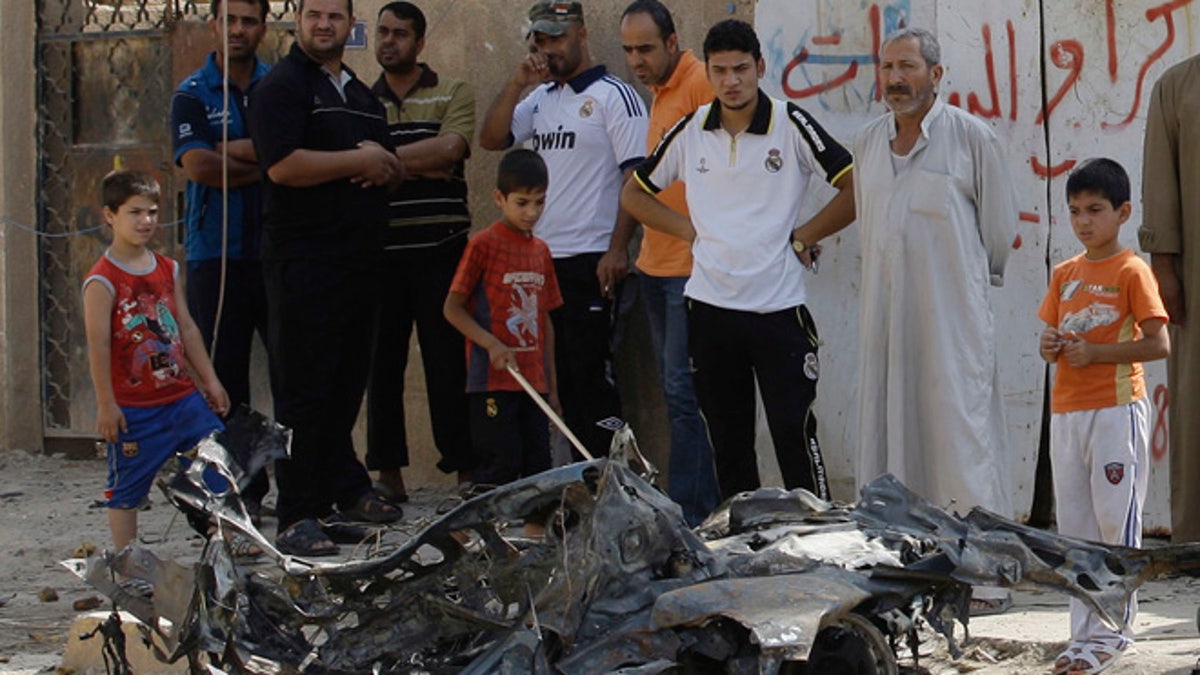
June 25, 2013: Iraqis inspect the aftermath of a car bomb attack at Baghdad's mostly Shiite neighborhood of Husseiniyah, Iraq. A series of evening bombings on near markets in and around Baghdad and other blasts north of the capital killed tens of people and wounded dozens of others Monday in the latest eruption of bloodshed to rock Iraq. (AP)
BAGHDAD – Demonstrators in an ethnically disputed northern city and a minibus carrying Shiite pilgrims to the holy city of Karbala were among the latest targets of Iraqi militants in a string of bombings that killed 20 people, authorities said Tuesday.
Iraq is weathering its deadliest outburst of violence since 2008, with more than 2,000 people killed since the start of April. The bloodshed appears to be largely the work of resurgent Sunni militants such as Al Qaeda, feeding off Sunni discontent with the Shiite-led government.
In Tuesday's deadliest attack, at least one suicide bomber blew himself up near Turkomen protesters who had set up tents in the city of Tuz Khormato, according to Ali Abdul-Rahman, a spokesman for the Salahuddin provincial governor. He said the protesters were demanding tighter security for the community following a deadly car bombing Sunday.
The Tuesday bombing killed at least 11 people and wounded 42, according to Munir al-Qafili, the head of the city council in nearby Kirkuk.
Among those killed were two Turkmen leaders, Ahmed Abdel-Wahed and Ali Hashem Mukhtar Oglou, according to the United Nations mission to Iraq.
"Such attacks aim to heighten tensions in this particularly sensitive region of Tuz Khurmatu," U.N. envoy Martin Kobler said in a statement.
Tuz Khormato sits in a band of territory contested by Arabs, Kurds and Turkomen about 125 miles north of Baghdad.
In another attack, five Shiite pilgrims were killed after their bus was struck about 35 miles south of Baghdad while it was traveling between the towns of Musayyib and Iskandariyah, according to police and hospital officials.
Tens of thousands of Shiites are gathering in the holy city of Karbala, 50 miles south of Baghdad, for the annual festival of Shabaniyah marking the anniversary of the birth of the ninth-century Shiite leader known as the Hidden Imam.
Earlier Tuesday, gunmen in a speeding car fired on a church in Baghdad's southeastern al-Amin neighborhood, wounding three guards, police officers and a health official said.
Police and hospital officials also said Tuesday that a bomb struck a teashop late the previous night in the restive northern city of Mosul, killing four people and wounding 15. Al-Qaeda in Iraq and other militant groups have been gathering strength in and around Mosul, some 220 miles northwest of Baghdad.
The officials provided details of the attacks on condition of anonymity because they were not authorized to release the information to journalists.
Tuesday's attacks struck as Iraqis were still cleaning up from a wave of evening bombings that targeted markets in and around Baghdad. Those attacks, which mainly hit Shiite or religiously mixed areas, and other blasts north of the capital Monday killed at least 42 people and wounded dozens of others.
The United States and Britain condemned the previous day's bombings in statements Tuesday. The U.S. Embassy called attacks during the Shiite festival of Shabaniyah "particularly reprehensible."
"We call upon the leaders and people of Iraq to work together to combat terrorism, and we are committed to assisting in these efforts to bring the attackers to justice," the U.S. Embassy said.
There has been no claim of responsibility for the latest attacks. Al-Qaida's Iraq branch, which has been gaining strength in recent months, frequently targets Shiites, security forces and civil servants in an effort to undermine the Shiite-led government in Baghdad.








































